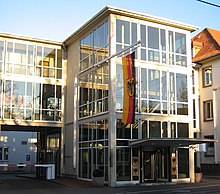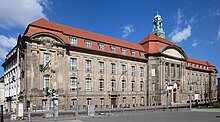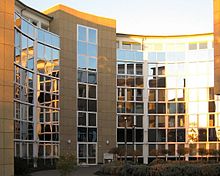Federal Ministry (Germany)
A federal ministry is a supreme federal authority assigned to a federal minister . According to Article 62 of the Basic Law , the Federal Government consists of the Federal Chancellor and the Federal Ministers. Within the guidelines set by the Federal Chancellor , each Federal Minister heads his department on his own responsibility. In addition to the ministry, this includes the upper, middle and lower federal authorities assigned to the department. The officials and employees of the Federal Ministry carry out his duties on behalf and in the name of the Federal Minister, in particular the supervision of the subordinate authorities and the political tasks towards the German Bundestag and the other federal organs . The ministry stands at the interface between political leadership ( gubernative ) and as a non-political administration ( executive in the narrower sense). The activities of the ministerial administration therefore differ from subordinate administrations.
history
According to Prussian tradition, administrative acts of the federal ministries are issued in first-person form and are related to the federal minister .
Ministries have become more and more differentiated throughout history. Historically, this becomes clear z. B. at the Prussian institution of the State Ministry , which comprised the entire government. The classic departments arose in the 19th century: finance, foreign affairs, war, home affairs and justice.
The North German Confederation or the German Empire did not use the term ministry . The Federal Chancellor had become the (only) responsible Federal Minister through Lex Bennigsen in 1867. The Federal Chancellery was initially the only supreme federal authority until the Prussian Foreign Ministry became the Foreign Office of the North German Confederation in 1870. The Prussian Foreign Ministry, founded in 1870, had already been renamed as the Foreign Office of the North German Confederation when it was taken over and continued to exist as such in the German Empire. The highest imperial authorities in the Empire from 1871 were called Reichsämter . Their bosses, the State Secretaries , took instructions from the Chancellor, so they were not ministerial colleagues. Only with the Weimar Republic were fully-fledged Reich ministries introduced. The Reich Justice Office (1877) established after the establishment of the Reich was not called the Ministry. This was based on the fact that the Reich Chancellery (at the beginning of the Empire under the leadership of Bismarck ) had the entire authority of the Reich, and it was not until later that a differentiation took place at the Reich level. In order not to allow the Reich government to assume responsibility vis-à-vis parliament, there were formally no ministers or ministries and therefore no collegial Reich government, although the state secretaries, as heads of the Reich offices, actually had a very similar position to the ministers.
In Germany the Federal Ministry of Defense ( Art. 65a GG), the Federal Ministry of Justice ( Art. 96 Abs. 2 S. 4 GG) and the Federal Ministry of Finance ( Art. 108 Abs. 3 S. 2 GG) are mandatory: The The Federal President must - on the proposal of the Federal Chancellor - appoint the relevant ministers, as they are mentioned in the constitution. The optional but classic ministries also include the Federal Ministry of the Interior and the Foreign Office . The other ministries are to be distinguished from the classic ones, recognizable by the "for" in the name ("Federal Ministry for ...").
The Federal Foreign Office has traditionally been accorded outstanding importance. The smallest ministries are the Federal Ministry for Economic Cooperation and Development and the Federal Ministry of Justice and Consumer Protection . The current federal government has 14 ministries.
Current federal ministries
| Official order |
Surname | abbreviation | Federal Minister | founding | First place of work | photo | Second office | photo |
|---|---|---|---|---|---|---|---|---|
| 1 | Federal Ministry of Finance | BMF | Olaf Scholz (SPD) | 1949 |
Wilhelmstrasse 97 10117 Berlin |
 |
Am Propsthof 78a 53121 Bonn |

|
| 2 | Federal Ministry of the Interior, Building and Home Affairs | BMI | Horst Seehofer (CSU) | 1949 |
Alt-Moabit 140 10559 Berlin |
 |
Graurheindorfer Strasse 198 53117 Bonn, Germany |

|
| 3 | Ministry of Foreign Affairs | AA | Heiko Maas (SPD) | 1951 |
Werderscher Markt 1 10117 Berlin |
 |
Adenauerallee 99-103 53113 Bonn |

|
| 4th | Federal Ministry for Economic Affairs and Energy | BMWi | Peter Altmaier (CDU) | 1949 | Scharnhorststrasse 34-37 10115 Berlin |
 |
Villemombler Strasse 76 53123 Bonn |

|
| 5 | Federal Ministry of Justice and Consumer Protection | BMJV | Christine Lambrecht (SPD) | 1949 |
Mohrenstrasse 37 10117 Berlin |
 |
Adenauerallee 99-103 53113 Bonn |

|
| 6th | Federal Ministry of Labour and Social Affairs | BMAS | Hubertus Heil (SPD) | 1949 Re-establishment: 2005 |
Wilhelmstrasse 49 10117 Berlin |
 |
Rochusstrasse 1 53123 Bonn |

|
| 7th | Federal ministry of defense | BMVg | Annegret Kramp-Karrenbauer (CDU) | 1955 | Fontainengraben 150 53123 Bonn, Germany |
 |
Stauffenbergstrasse 18 10785 Berlin |

|
| 8th | Federal Ministry of Food and Agriculture | BMEL | Julia Klöckner (CDU) | 1949 | Rochusstrasse 1 53123 Bonn |
 |
Wilhelmstrasse 54 10117 Berlin |

|
| 9 | Federal Ministry of Family Affairs | BMFSFJ | Franziska Giffey (SPD) | 1953 Founding: 1994 |
Glinkastraße 24 10117 Berlin |
 |
Rochusstrasse 8-10 53123 Bonn |

|
| 10 | Federal Ministry of Health | BMG | Jens Spahn (CDU) | 1961 | Rochusstrasse 1 53123 Bonn |
 |
Friedrichstrasse 108 10117 Berlin |

|
| 11 | Federal Ministry of Transport and Digital Infrastructure | BMVI | Andreas Scheuer (CSU) | 1949 |
Invalidenstrasse 44 10115 Berlin |
Robert-Schuman-Platz 1 53175 Bonn |

|
|
| 12 | Federal Ministry for the Environment, Nature Conservation and Nuclear Safety | BMU | Svenja Schulze (SPD) | 1986 |
Robert-Schuman-Platz 3 53175 Bonn |
 |
Stresemannstrasse 128–130 10117 Berlin |

|
| 13 | Federal Ministry of Education and Research | BMBF | Anja Karliczek (CDU) | 1955 | Heinemannstrasse 2 53175 Bonn, Germany |
 |
Kapelle-Ufer 1 10117 Berlin |

|
| 14th | Federal Ministry for Economic Cooperation and Development | BMZ | Gerd Müller (CSU) | 1961 | Dahlmannstrasse 4 53113 Bonn |
 |
Stresemannstrasse 94 10963 Berlin |

|
Former federal ministries
Offices in federal ministries
The Federal Chancellor and the Federal Ministers have a public-law office relationship in accordance with the Federal Ministers Act (BMinG), the Parliamentary State Secretaries and the State Ministers have a public-law office relationship in accordance with the Act on the Legal Relationships of Parliamentary State Secretaries (ParlStG). All other offices are with federal officials busy, in a civil service law royal employment after the Federal Civil Service Act are (BBG).
| Official title | abbreviation | Grade |
|---|---|---|
| Elected representatives (political position) | ||
| Chancellor | BK | 1.66 times that of B 11 |
| Federal Minister | BM | 1.33 times that of B 11 |
| Parliamentary State Secretary or Minister of State | PSt, PSts, Stm | 0.75 times the ministerial salary (corresponds to B 11) |
| Higher service (academic university degree or master’s ) | ||
| State Secretary | StS, Sts | B 11 |
| Ministerial Director | MinDir, MD, MDir | B 10 (Deputy Spokesman for the Federal Government or Deputy Head of the Federal Press Office ), B 9 (Head of Department) |
| Ministerial Director | MinDirig, MDirig, MDgt, MDg | B 6 (department head or sub-department head) |
| Ministerial Council 1 | MinR, MR | B 3 |
|
Ministerial Councilor , Senior Government Director 2 |
MinR, MR, LRD |
A 16 |
| Government Director 3 | RDir, RD | A 15 |
| Upper Government Council 4 | ORR | A 14 |
| Government Council 5 | RR | A 13 (entrance office) |
| Senior service ( university degree or bachelor's degree ) | ||
| Higher Government Office 6 | ROAR | A 13 |
| Government Council 7 | RAR | A 12 |
| Government Official 8 | RAmtm, RAmtfr | A 11 |
| Chief Government Inspector 9 | ROI | A 10 |
| Government Inspector 10 | RI | A 9 (entrance office) |
| Middle service (at least three years of vocational training ) | ||
| Government Inspector | RAI | A 9 |
| Government Chief Secretary | RHS | A 8 |
| Government Secretary | ROS | A 7 |
| Government secretary | RS | A 6 (entrance office) |
| Simple service (semi-skilled and unskilled) | ||
| Chief magistrate | OAM | A 5 or A 6 (prominent posts) |
| Magistrate | AT THE | A 4 |
| Full-time assistant | HAG | A 3 |
| Senior clerk | OAG | A 2 (entrance office) |
- Remarks
Only at the Foreign Office (AA) are the following regular official names replaced by independent ones:
Employees within the meaning of the collective agreement for the public service (collective agreement for the public service) are not civil servants and thus do not have an employment relationship under civil service law, but rather a private law employment relationship. Employees do not have official titles , but are referred to as collective bargaining employees and do not receive a salary , but remuneration according to TVöD (salary groups E 1 to E 15, comparable with the salary groups of civil servants). The occupations that collective bargaining employees usually hold include: B. Administrative clerk , specialist for office communication and clerk for office management .
Official state secretaries and ministerial directors are so-called political officials ; According to Section 23 BeamtStG , Section 36 (1) No. 1 of the Federal Civil Service Act (BBG), they can be put into temporary retirement at any time. Parliamentary state secretaries can be dismissed at any time in accordance with § 4 sentence 1, 1st HS ParlStG .
There are also other offices with special status, e.g. B. in connection with a function as a supervisory authority. For example, the Federal Commissioner for Data Protection and Freedom of Information has a public-law office relationship with the federal government ( Section 12 (1) BDSG) and was part of the Federal Ministry of the Interior's division until 2016 and was subject to its supervision ( Section 22 (5) p. 1 and 2 BDSG ). In parallel to the administrative-organizational position of his authority as an outsourced department, the BfD, as head of this authority, received official salaries in the amount of the salary due to a federal civil servant in grade B 9 ( Section 23 (7) sentence 1 BDSG).
In the Foreign Office, service and office names that differ from those shown above are sometimes used. For example, the government council z. A. (job title) called Legation Secretary. In addition, an official of the Foreign Office who is deployed abroad, in accordance with international customs and agreements, sometimes also has a title or other official title, which is based on the activity at the diplomatic mission and international customs: Consul, Counselor; Embassy secretary; Chancellor
In addition to civil servants and employees, external employees have been working in German federal ministries for several years . These are not classic freelance workers who are financed by the ministries, but people from the private sector, associations and interest groups who continue to be employees of their actual employer and are paid by them. This is partly done as part of a staff exchange program that has been established since 2004, partly in the form of secondments, which are referred to in publications by the Federal Government as “external employees”, “posting” and “seconding”. Observers see this as a new dimension of lobbying right up to the “haze of corruption” ( Hans Herbert von Arnim ).
literature
- Heinz Hoffmann (editor): The Federal Ministries 1949–1999. Designations, official abbreviations, responsibilities, organizational structure, management personnel (= materials from the Federal Archives . Issue 8). Wirtschaftsverlag NW GmbH, Bremerhaven 2003, ISBN 3-86509-075-3 (including CD-ROM with the book content).
Web links
- The Federal Ministries on the Federal Government's website
- Text of the organizational decree of the Federal Chancellor of March 14, 2018
Individual evidence
- ↑ Werner Frotscher / Bodo Pieroth : Verfassungsgeschichte , 5th edition, Munich 2005, marginal number 211.
- ↑ Werner Frotscher, Bodo Pieroth : Verfassungsgeschichte , 5th edition, Munich 2005, Rn 428 ff.
- ↑ List of federal ministers in the official order . March 16, 2018 ( BAnz AT March 16, 2018 B1 - Annex 2 of the announcement of the formation of the government on March 14, 2018).
- ↑ according to Appendix 1 to § 9 paragraph 1 of the Federal Career Ordinance (FSVO)
Remarks
- ↑ a b c In fact, due to multiple non-application of the salary increases in accordance with the Non-Adjustment Act , significantly lower.

